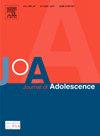Peer Influence and Selection Impact on Adolescent Aggression: Exploring Nonaggressive Delinquency, Peer Victimization, and Moral Disengagement
Abstract
Objective
To investigate the effects of nonaggressive delinquency, victimization, and moral disengagement on aggression at both the individual and social influence levels.
Methods
We collected two consecutive rounds of longitudinal data, with a 6-month interval, from seven high schools in the central region of China in 2016, comprising a total of 2406 valid samples. The Stochastic Actor-Oriented Models (SAOMs), a dynamic network analysis method is used explore the effect in individual and social influence levels.
Results
The main findings are as follows: (1) At the individual level, we found that nonaggressive delinquency and moral disengagement were significantly positively associated with proactive aggression, while victimization was significantly related to proactive aggression but not reactive aggression. (2) At the social influence level, our findings highlighted the presence of a selection effect in adolescent friendships. Specifically, adolescents were more likely to form friendships with peers of the same gender, socioeconomic status (SES), and similar levels of nonaggressive delinquency and moral disengagement. (3) Regarding friends' negative behaviors and attitudes, friends' moral disengagement and peer victimization were not significantly associated with individual levels of proactive and reactive aggression. However, friends' nonaggressive delinquency had a significant negative association with adolescents' reactive aggression, while no significant association was found with proactive aggression.
Conclusion
This study used SAOMs to examine how individual and social factors influence adolescent aggression, finding that individual delinquency and moral disengagement significantly associated with aggression. While friends' victimization and moral disengagement had no direct effects, friends' delinquency reduced reactive aggression, and friends' overall aggression increased individual aggression.

 求助内容:
求助内容: 应助结果提醒方式:
应助结果提醒方式:


